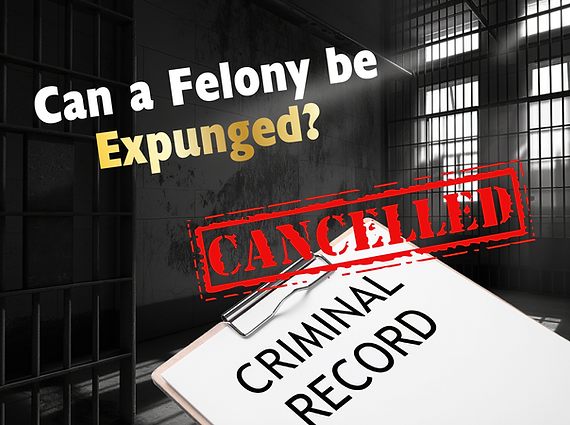You are certainly not alone in understanding that a conviction can be much more crippling to a person’s life than merely receiving jail or prison time. Such examples would come from what happens after. That individual is now out in the world looking for a job, a house, or a loan, trying to rebuild from past wrongdoings, but a criminal record does not help.
This begs the question of, is there was a way to have these records wiped? One way possible would be to have them expunged. Unfortunately, here in Florida that isn’t a possibility in the case of a felony charge! Let’s dive into exactly why that is and what options you may have.
What does Florida Law state regarding felony convictions and expungement of records?
According to the Florida Department of Law Enforcement, “Persons who have been convicted (adjudicated guilty) of a felony are not eligible for an expungement or sealing of their criminal history record under Sections 943.0585 or 943.059, F.S., regardless of whether their civil rights have been restored.” What does that truly mean? Well to better understand, we must first understand what it means to have something expunged from your record.
What does expungement of records mean?
The Legal Information Institute defines the term “expunge” by saying it means “to destroy, obliterate, or strike out records or information in files, computers, and other depositories”. This in the context of a criminal record would mean completely wiping the charge from all databases.
Florida, like most states, puts a restriction on which crimes can be expunged from one’s record. Such as felony charges of any kind can not be expunged!
What happens if you were arrested but never convicted of the crime?
An important case to consider when it comes to expungement in Florida is if you weren’t convicted, but merely arrested, for a crime. This, unlike any charged felony, gives you the grounds to expunge the arrest from your criminal record.
Do expungement rules differ by state?
The short answer is, yes, expungement rules differ from state to state. The important thing to keep in mind about the latter is how expungement functions. Since the process of having your record expunged happens at the state level, it is possible that, depending on the severity of the charge, your record wouldn’t be expunged in Florida.
With that being said, you need to work within your state’s system to have criminal records expunged. The first thing you should do when looking to have records expunged is contact a criminal defense attorney that you can trust! Here at Demesmin & Dover Law Firm we offer free consultations and can aid in your full understanding of the situation you’re in. You’ll then be aware of the eligibility for expungement of said information and know what actions to take next.
What determines if you’re file is eligible for expungement?
The eligibility for expungement primarily depends upon the nature of your offense, the passing of time since your most recent offense, and if all the fines from your case were paid. In the case of a felony offense, you don’t have many options due to Florida’s rules on expungement, but what is a possibility is fighting for post-conviction relief under Florida Rule of Criminal Procedure 3.850. This would look to turn your felony charge into a misdemeanor before having it expunged, but this process would be extremely challenging to accomplish!
If you are eligible for expungement, what are your next steps?
After finding out your eligibility for expungement through free consultation with a lawyer, you must next submit an official application to the court for expungement. The Florida Department of Law Enforcement (FDLE) has an application that you can use to submit for an official Certificate of Eligibility. This application is submitted directly to the court with the detailed reasoning for your record’s expungement. It includes all the important details from your arrest dates to notices to appear in court, to a certified disposition for each charge, to even a letter of representation from the attorney representing you.
Something to note when applying is that “the processing time to determine eligibility is typically 12 weeks from the date a completed application packet is received. Extensive research is required to determine eligibility and several factors contribute to the processing time of an application packet. Application packets are researched in the order received. FDLE does not expedite application packets.”
The final steps to expungement begin with you attending a hearing if needed. This hearing would be for you to demonstrate why your record should be expunged. If there is no opposition to your record being expunged, this step would not be necessary. If so, be ready to show the court additional information in support of your expungement. After successfully demonstrating to the court why your criminal records should be expunged, you’ll then want to confirm that they did follow through and either seal or destroy your records. Once your expungement is granted, a court order is given to appropriate police and state agencies that have copies of your records letting them know to expunge them.
You can confirm this has happened by requesting a copy of your criminal record after a reasonable period has passed since the order. If you do not see the information on your record, then it has been expunged.
Understanding the ins and outs of the expungement process is critical when looking to have your records sealed or expunged, it is also of the utmost importance you understand your state’s laws regarding expungement! In Florida, your criminal record is unable to be sealed or expunged if you were found guilty by a judge, pled guilty, or are a nolo contender (no contest) for felonies.
What is defined as a felony charge?
With that being said, let’s dive into what a felony is defined by the Legal Information Institute as “a type of offense punishable under criminal law. Many states classify felonies under different categories depending on the seriousness of the crime and its punishment.” Most of the states classify felonies in classes, starting from class E (the lightest punishment) up to class A (the harshest). Florida operates a little differently than most states in the sense that we classify felonies into five degrees, as opposed to letter classes.
Florida’s felonies, from lightest to harshest punishment, are as follows:
felony in the third degree: are punishable by no more than five years in prison and a five thousand dollar fine
felony in the second degree: up to fifteen years in prison and a ten thousand dollar fine
felony in the first degree: up to thirty years in prison and a ten thousand dollar fine.
life felony: up to forty years in prison and a fifteen thousand dollar fine. up to forty years in prison and a fifteen thousand dollar fine.
capital felony: punishable by death or life imprisonment without the possibility of parole in state prison
If you find yourself in a situation where you were found guilty, pled guilty, or are a nolo contendere (no contest) to any of these felonies, then it is not likely that you’ll ever have it expunged in the state of Florida.
Therefore if you’re in a situation where an arrest in the past is hindering your life (finding a job, getting a loan, etc.), know that you aren’t out of options. It is possible to have a felony expunged from your record, the odds just aren’t in your favor!
Why you should contact a criminal defense attorney…
First and foremost, you should contact a lawyer at Demesmin & Dover Law Firm for a free consultation to better understand your options and know if there is a chance you can have your records expunged. It is important to note that if you were not found guilty, did not plead guilty, or were nolo contendere, then you still may be able to have your record expunged. This is dependent on the severity of the charge, your criminal history, and how well your case for expungement is.
The expungement process can be more forgiving in some states than others, but Florida is one of the most strict of them all. With that fact in mind, if you are charged with a felony in the state of Florida you should hire an experienced criminal defense attorney as soon as you can. A felony charge should not be taken lightly, but with the right lawyer at your side pleading your case, the charges can be dropped or reduced.
In the long run, this can come back to being a big win because expunging your record becomes a major possibility, as opposed to a shot-in-the-dark chance. Once you’ve completed the expungement process and have had your records sealed or expunged, don’t forget to go check for yourself to confirm the records are off of public databases. After that, feel free to enjoy the life that you deserve to be living now that you don’t have an age-old criminal record, that you’ve long outgrown, hanging menacingly over your head like the ghost of Christmas past.



